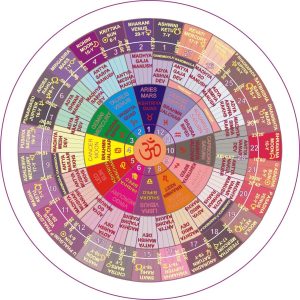The review, published in an international journal, said people are compulsively seeking astrology, leading to mental health issues.

The human mind does not do very well in uncertain situations and in times of stress, and hence looks for coping mechanisms, which could be astrology. When that turns into an obsession, it leads to mental health problems. (Creative Commons)
A 35-year-old man was going through a bad phase of his life. He decided to deal with his problems by consulting astrologers. He began his search for astrologers online through various apps when he couldn’t find solutions to his problems offline.
Though this would be considered a normal phenomenon in India, where people do trust astrologers, the problem began when he started to jump from one astrologer to another continuously, leading to severe financial losses.
The outcome of all these consultations: Nothing. This, again, caused him severe anxiety and depression.
Though he knew it would not help him, he couldn’t control the urge to consult astrologers, leading to other mental health conditions.
This case study led four clinical psychologists from the National Institute of Mental Health and Neuro Sciences (NIMHANS) in Bengaluru’s Department of Clinical Psychology and Service for Healthy Use of Technology (SHUT) clinic to decide to probe more into such cases.
They also looked at the need to understand if there was existing literature on the correlates of belief in astrology and fortune telling.
“The search findings revealed the association of belief in astrology with cognitive, personality, and psychological factors such as thinking style, self-concept verification, and stress,” explained Dr Manoj Kumar Sharma, who runs the SHUT clinic and has over a decade’s experience in dealing with behavioural addictions.
He is also the corresponding author of the study.
The psychologists reviewed almost 101 available research papers online and found that there was an association between mental health issues with the obsessive use of astrology.
Case studies on “fortune-telling addiction” from the existing literature, the authors said, also conceptualised a possible behavioural addiction and reported mental health issues like distress, cravings, and salience.

SHUT clinic is run primarily by Dr Manoj Sharma, who has over a decade’s experience in dealing with behavioural addictions. (Supplied)
Sharma and his team — PhD scholar Abhilasha Das, associate professor Himani Kashyap, and clinical psychologist Srijita Gupta — found that Google Trends reported that searches for “birth chart” and “astrology” hit a five-year high in 2020 after the pandemic, indicating that this belief and interest in astrology was on the rise.
There were research papers also to corroborate this.
Meanwhile, in India, they found that there were nearly 18 startups that launched astrology apps and many of these apps saw a growth rate of 4-400 percent.
“Even in our clients we saw several people believing in astrology, fortune-telling or ‘universe will do the magic’ sort of things,” Sharma told South First.
“Though these things may not always have major negative consequences and can also provide some kind of reassurance and stress-relief in difficult times, especially pandemic-kind of situations, they will become mental health concerns if the person becomes excessively preoccupied with it,” he said.
The review paper — Fixating on the future: An overview of increased astrology use — has been published in SAGE International Journal of Social Psychiatry.
While Sharma believes that in India seeking out astrology is an inbuilt and culturally shared concept, there is a strong belief in planetary movements and their impact on each person etc.
He explained that the human mind does not do very well in uncertain situations and in times of stress. Hence, astrology can in some ways act as a coping mechanism for individuals.
He said his clients — who are dependent on astrology — tend to have been in a crisis situation like job loss, divorce, or ill-health.
Here, astrology seems to represent an easy and immediate tool to turn to for comfort.
“When they don’t get quick remedies, they seek assurance from someone external. They like to hear and reiterate that things will be fine soon and the situation is not going the way they want to due to planetary movements. This becomes their coping mechanism,” said Sharma.
Also, astrology can be an easy way to blame “life consequences” on external forces if something goes wrong. This way, people need not take responsibility for their actions.
Meanwhile, existing literature analysed for the study also showed that astrology could appeal to people who have a pronounced intolerance for ambiguity. “The dependence totally went up during the pandemic and continues even now,” Sharma said.
While cautioning that seeking astrology in itself is not being questioned, or that the review questions the working of astrology, the doctors from NIMHANS said becoming excessively preoccupied with astrology leads to negative consequences.
Interestingly, “fortune telling addiction” is also clearly classified as a behavioural addiction, said the doctors.
Sharma said: “The compulsion to seek consultations, increasing distress, and excessive spending may lead them to severe disappointment when they start feeling that ‘this is not working for me’. They also go into depression, low mood states, or anxiety.”
He added: “It also leads them to passive ways of approaching issues in life. For instance, they may say the Universe will take care of it. This passive approach to life can create a problem. Also, if people start blaming others or luck for everything, they will not have problem-solving abilities and self-control will be gone.”
Meanwhile, another mental health specialist, Dr Ashvini V, who is not associated with the study, told South First, “I have come across individuals with the compulsive urge to keep running from one astrologer to the other, or with an overwhelming desire to read astrological predictions online. While they might be compulsively seeking astrological predictions in order to stop the stress and anxiety that the uncertainty of the future brings, when negative predictions are made of the future, it is likely to give rise to even more stress and anxiety.”

Obsession with astrology can lead to mental health issues, say mental health experts from NIMHANS. (Creative Commons)
She added, “While I do not understand the practice of astrology, what I do know is that some individuals prepare well in advance for the predicted future and feel secure, while some experience intense anxiety regarding the future when what’s predicted is undesirable.”
Asvini also said: “It isn’t surprising if seeking astrological predictions become compulsive and uncontrollable even when we know there are negative consequences attached to it, because according to the mindset of a believer in astrology, the security and solace that astrological predictions might have brought occasionally will outweigh the negative implications of it.”
Sharma, meanwhile, explained that this kind of attachment to astrology is seen more in older adults: those aged more than 30.
However, he said, it might be interesting to explore among younger people as well.
Meanwhile, admitting that there was not enough availability of literature on the topic from India, the authors of the study said more research on the condition along with its psychosocial determinants was necessary for the development of preventative and curative intervention efforts.
Sharma said, “While there have been cases with an obsession of astrology and related topics like daily horoscopes, and it being part of Indian culture also, there is definitely a need for data and research on this from India. We need to look at doing more research on this as there is almost no published paper on this.”
Dr Alok Kulkarni, a mental wellness expert and senior consultant psychiatrist from Hubballi, concurred.
Kulkarni, who is not part of the study, said, “It is an accepted cultural construct. Hence, it cannot be qualified as an addiction given India’s socio-cultural demographics. However, in instances when a prediction does not come true, it can have broader clinical ramifications in the form of anxiety and depression.”

Apr 18, 2024

Apr 17, 2024

Apr 17, 2024

Apr 17, 2024

Apr 17, 2024